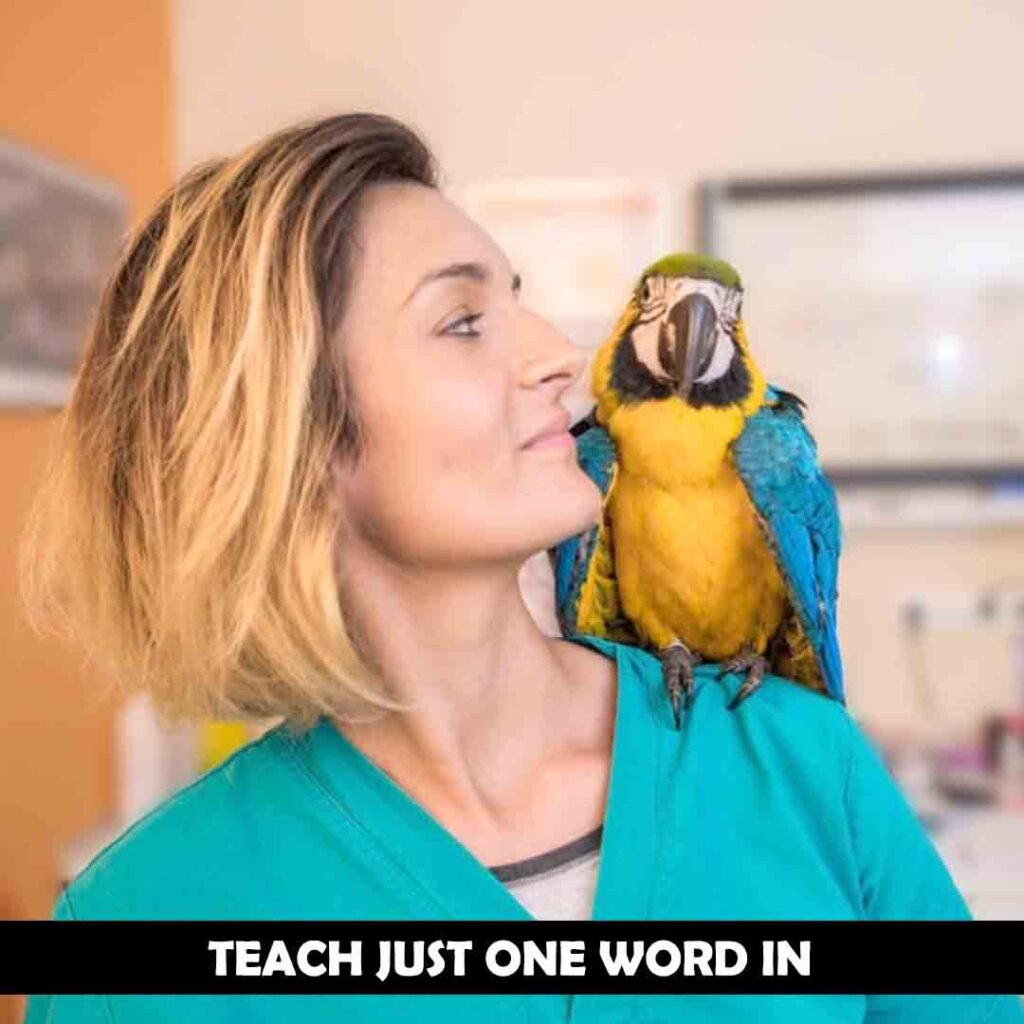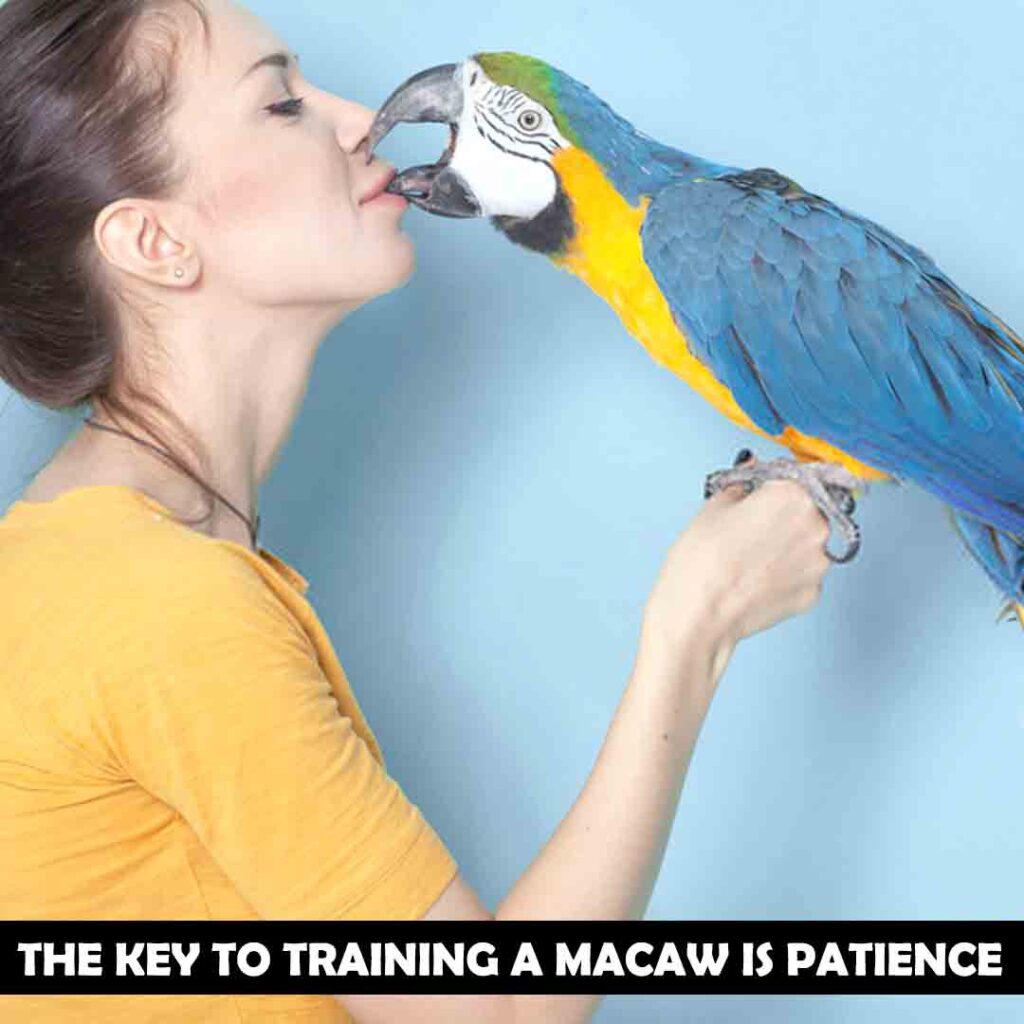Last Updated on February 8, 2022
In the wild, the macaws are very social and move freely for their survival. But in captivity, they need the training to adapt. It is an essential need of all macaws to fit well in their situation. They can be trained as pets because of their beautiful colors, social and interactive behavior, and ability to talk and perform tricks.
Soon after weaning, the macaw is independent, and you can train it according to your interest. Macaws are interactive, so they need less time to prepare as compared to other parrots. Here I will discuss the easy steps of training your macaw.
How To Train A Macaw As A Pet?
When you introduce a macaw to your flock, The essential requirement is to train it as a pet. As you know, macaws develop strong bonding with their owners. That is why it is easier to train macaws than any other parrots. If your bird is bonded with you, it will learn quickly. Some essential training tips are below when you want your macaw to become used to you and best adapted.
- The training environment should be safe, calm, and comfortable so that they will learn effectively.
- Spend some time with your macaw. The best practice is to move around it, talk to it, watch its movements. For this, place the cage in the area where you do most of your tasks. In this way, it will start recognizing your face and voice.
- When your macaw gets familiar with you and your surroundings, start feeding it. Come close to the cage and provide it with fresh fruits, vegetables, seeds, or nuts with your hands. With patience, wait for it to eat. Repeat this daily, and you will see within a few days it learns to trust you. He gets the habit of taking food from your hand within two weeks.
- Hence, it learns to take a feed from your hand outside the cage. Now start giving it a meal by moving your hand inside the cell. It will help your macaw to gain more trust in you.
Now your macaw is comfortable with you, and you can move to the next training.
How To Train A Macaw To Step Up?
If your macaw is trained to step up, you can touch it gently because it is familiar to your hand. You can also stop your parrot from biting by giving it step-up training. Before training, you should follow some important things.

- For this training, be prepared with all the equipment needed in this training.
- Choose the treat that your macaw can eat quickly.
- Start the session early when birds are active.
- Conduct different training sessions. Not all the day. It must be a 15-20 min session. You can do it twice a day.
- The time of the training session should be the same daily. Otherwise, your macaw will get bored and lose interest.
- Get rewards with your hand to encourage the bird. It is necessary to keep your bird calm.
Training Your Macaw To Step Up
When your bird is used to taking special treats from your hand, it is an excellent time to train your macaw to step up.
- Allow the macaw to sit on a perch. Hold a treat in one hand, attract the bird to come closer to the step-up hand.
- Keep your step-up hand in front of the bird at a higher level than the perch.
- Allow the macaw to take the meal by giving a command step up.
- Repeat this if the bird is not responding.
- When the bird comes close to the step-up hand to take the meal, reward it.
- When macaw is used to step up your hand, repeat this daily. It will take a few sessions, and macaw will be an expert on it.
- All family members can do this practice. Repetition is key to success.
- When the bird steps up, reward him. Start with small but favorite treats.
- Give reward when he obeys a command.
- At first, you may reward the bird for only putting one foot on the step-up hand. But increase the reward as it goes further.
Now your macaw is comfortable and ready to get training on the next skill. Take it out of the cage and continue the activity in other quiet environments where it pays more attention to you.
Training Your Macaw To Step Down
- It is time to teach your macaw to step down.
- Keep your hand in front of a macaw but lower than a perch.
- Use the same technique you use for stepping up. Put the meal on the step-down and allow the macaw to step down.
- Say it clearly and repeat this until it learns to step down.
- Keep rewarding for encouragement.
- Be consistent for success.
Train Your Macaw to Laddering.
After learning step up and step down techniques, it’s time to teach your macaw laddering. In this technique, the macaw will learn to step up from the finger of one hand to a finger of the other hand, which is held higher. The macaw becomes accustomed to doing this when repeated again and again. This command should be repeated daily and helps to develop a close relationship between you and your macaw.
- Never yell at your bird and punish him in any way. It will reinforce the behavior you are trying to diminish.
- Speak softly and stay calm and offer your bird treats to build your bird’s trust and gain its confidence.
- Maintain steady contact with your bird’s eye.
- Check your bird’s tolerance level. If you train your bird for too long out of its comfort level, the bird gets aggressive.
- Check out how long the bird will tolerate you and train your bird accordingly.
- Do not put too much extra pressure on your bird, where the bird may lose its temper.
How To Train Your Macaw To Talk?
You have bought your macaw and wonder if it does not talk. Soon after weaning, is it too young to speak? It is an excellent time to teach your macaw how to learn some words and phrases. Will it be able to talk? Is talking natural behavior of macaws? Can you train your macaw to talk?

You can train macaws to say some words and phrases when used to you, trust you and develop close bonding with you. They learn to talk within three months to one year, depending upon the species, their personality, the way of training, and strong bonding with macaws. Giving attention, repetitions of words, and your calm behavior will make your pet a good talker.
Why Do Macaws talk?
Macaws are very social and interactive. That is why they may learn to say words. In the wild, they may interact with each other by producing different voices. They are very noisy and social parrots. They talk because they;
- Use a vocal organ, syrinx that is located at the base of their windpipe. It helps macaws to chirp and make a noise in the wild.
- In captivity, they use it to mimic the words they hear. With proper training, they can even talk like humans.
- Utilize natural behavior of making noise and being social produce different voices to interact with other birds in the wild and captivity.
- Want attention; they feel happy to be noticed and need attention from the owner. If not possible, it gets angry and makes different voices. They accomplish their desire to call attention by producing various types of sounds.
- Communicate with the owner. In the wild, they communicate with their companions by vocalizations. Macaws usually have a high-pitched voice. They can produce different voices and put them into words and even phrases if appropriately trained.
Steps Involved In Training A Macaw To Talk
Macaws are brilliant birds and can mimic human speech. With proper training, they can speak a few words and phrases to entertain their owner and others in their surroundings. When your bird is used to you and its surroundings, start recognizing your face and voice, taking meals from your hands, and playing with you are good signs that your bird is ready for any training.
Your bird is now relaxed and firmly bonded with you. Followings steps should be followed while training your macaw to talk;
Selection of Word
The first step is to select the words that you want your parrot to say. Macaws can mimic the words they hear from their owner. Be careful while choosing the words because macaws have a good memory and remember the words they have taught all around their lives.
- Start with simple words like Hi, Good, Bye, etc.
- Words must be ordinary and easy to understand in our daily life.
- Words must be clear and frequently used.
- Words must have good meanings. Otherwise, you will regret it because macaws do not forget the word once they have taught.
Speak the selected word daily to your macaw. Whenever you encounter your bird, you should repeat in a medium-pitched voice. Sometimes macaws do not remember the words they taught with a high-pitched voice when spoken in a low-pitched voice.
Stick To One Word
Teach only one word. When your macaw becomes habitual to that word, then move to the next one. If you start teaching more than one, your bird will get bored or get tired soon. Depending upon different species of macaw, learning ability varies. Some macaws are fast learners, and others are slow. The blue-and-gold macaws are known to learn words more quickly than others.

Usually, a macaw takes three months to one year to talk, depending upon the species. It can be polished by training properly. Because of their long-term memory, they can remember and speak more than 150 words and phrases.
Encourage by giving treats.
During training, give some treats to your macaw. Start saying words by yourself first. Give some meal to your bird to hear and repeat it. When it tries to say that word, you should offer a favorite meal to encourage it. Encouragement is necessary for successful training. It helps
- To motivate the macaw
- To increases the interest in learning
- To learn the word in a short period
- To keep them active and healthy
Repetition and Continued Rewards
Macaws can learn the words which they hear in their daily life over and over again. They become used to hearing those words. That is why they try to repeat them. So repetition is the basic rule if you want your macaw to learn to talk fast.
Daily repeat the word with the same enthusiasm in front of your macaw. Try to make it happy by giving rewards even on their little effort to speak. This practice will give positive results towards the macaws learning process.
Be Patient And Wait
Patience from your side is required. Start with one word to train. When you feel your bird is easy to talk with that word, start a new one. Slowly and gradually, the macaws learn to speak effectively. A macaw usually takes one week to master one word. It is only possible if the trainer is patient and repeats the sessions daily.

Associate Words With Actions/ Objects
Try to associate the word with your actions or objects. If you are training your macaw to say the word apple, then you can use an apple. The most excellent way is to offer an apple to your macaw and say the word apple. In this way, you have to repeat the phrase twice a day.
The macaws are intelligent and interactive. With visuals and vocals, they become ready to relate the word with the object. Whenever they see an apple, they will speak the word apple. They will remember it if taught once.
Use Your Voice
Using your voice is best while training your macaw to talk. The macaws who are living with humans and healthy tend to learn fast as compared to the wild. They are used to hearing human voices.
Macaws make close bonds with their owners and are prone to learn new words. They are familiar with the voice and feel comfortable while training.
No artificial tools
Do not use artificial tools to train your macaw. Training your macaw by your sound is good. If you use artificial ways like a tape recorder, CDs, and Mobile phones, your parrot will get frustrated due to lack of interest, high pitched sounds that are new to them. Sometimes, they get scared of loud sounds and music, leading to a slow learning process.
Next Word or Phrase
When your macaw is comfortable speaking the word, you have taught him. Move to the next one. Repeat the same as you have done with the first word. Macaws also can learn exact phrases. With patience, you can train them properly.
Question Answer Session
When a macaw is talking words clearly and frequently and easy with the training to go on. Now it’s time to question and answer sessions. Follow the same way as you do while teaching the new word to your macaw. Repetition with reward will give good results.

Start asking how you are? I am good. Repeating the sentence, again and again, will help macaw to follow your tone easily. Offer some treats for motivation.
Clicker Training
Some people use the clicker to teach the macaw. The clicker is readily available at pet stores and online. Your macaw gets associated with the click. After hearing the click, it will speak the word followed by the treat. Treat will help macaw to learn the word or phrase quickly.
Conclusion
Training your macaw is easy with training sessions on stepping up, talking, and performing tricks. For successful training, treat your macaw politely. Never hit your macaw to maintain your trust and well-bonding. If not treated well, macaws get scared and feel it alone. In this situation, they will not be ready to do any task. Train it slow and steady. It helps macaws to absorb and remember new things for longer. It also allows macaws to become familiar with their surroundings and owner. Use positive reinforcement, and a short session of 15-20 min is good. Training should be regular but not for the whole day. Encourage the macaw with rewards and treats.
Also Read About: Are Macaws Smart? Which Breed of Macaws is the Smartest?
Bilal is an aviculturist who loves to write in free time. His personal experience with bird care and breeding enables him to share valuable tips. So far, he has contributed more than 100 blogs to this site.
His goal is to promote bird-keeping and save endangered species.
